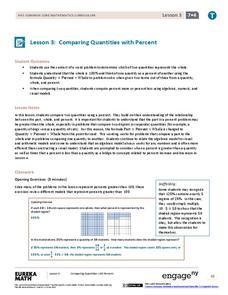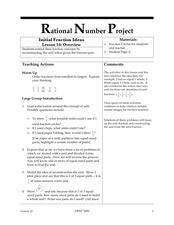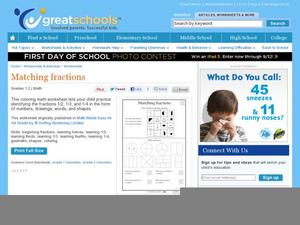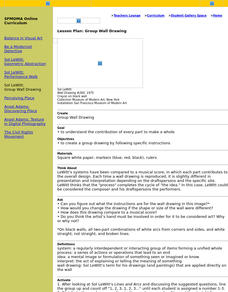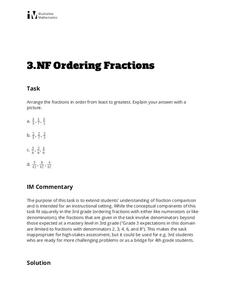Illustrative Mathematics
Make 9
Learning how numbers are put together as parts and wholes is a big step in building the foundational number sense of young mathematicians. Here, children are given a number less than 10 and are asked to find as many pairs of numbers as...
Curated OER
I'll Halve S'More, Please!
An episode of Cyberkids is shown, and learners interact with web based activities to discover how fractions are parts of a whole. They study the names of fraction parts, add and subtract fractions, and recognize equivalent fractions.
EngageNY
Comparing Quantities with Percent
Be 100 percent confident who has the most and by how much. Pupils use percentages to help make the comparisons by finding what percent one quantity is of the other. They also determine the percent differences between the two...
Curated OER
Initial Fraction Ideas Lesson 16: Overview
Kids will compare creating fractions from pieces of paper to chips. They begin with a fractional part and work back to a whole. Then order fractions from smallest to largest. They also complete a worksheet to find the missing pieces to...
Curated OER
Matching Fractions
Focus on halves, thirds, and fourths in these visual fraction activities. Scholars begin by examining a grid with various expressions of the three fractions displayed in the grid squares. They color-code the grid to indicate which...
Curated OER
Group Wall Drawing
Students create a group wall drawing that demonstrate the contributions that each part makes to the whole.
McGraw Hill
Adding and Subtracting Mixed Numbers
Adding and subtracting mixed numbers will be a breeze with this guided worksheet packet. Learners work through examples outlining each step including rewriting mixed numbers as improper fractions, adding numerators, and rewriting the sum...
Northern Arizona University
Adding and Subtracting Fractions
Pattern blocks and shapes demonstrate how to add and subtract fractions. By aligning blocks with different shapes, learners figure out how to create a whole, and then how to add and delete parts from that whole.
Oregon Department of Education
Building Number Sense
It's never too early to begin a child's math education. This collection of fun hands-on activities engage youngsters in building their number sense as they learn how to count objects, identify numerals, compare amounts, and much more.
Illustrative Mathematics
Ordering Fractions
Here is a comparing and ordering fractions learning activity that extends young mathematicians understanding of fractions with like and non-like denominators. By representing and explaining each fraction in a picture or diagram, students...
California Academy of Science
Earthquakes and Tectonic Plates
Here is a comprehensive package in which middle schoolers learn about types of seismic waves, triangulation, and tectonic plate boundaries. Complete vocabulary, colorful maps, and a worksheet are included via links on the webpage. You...
Santa Ana Unified School District
The Power of Point of View
Sometimes a whole story can change based on the perspective of the person telling it. Practice identifying and analyzing point of view in various reading passages and writing assignments with a language arts packet, complete with Common...
Illustrative Mathematics
Representing Half of a Circle
Geometric shapes make great visual models for introducing young mathematicians to the concept of fractions. Looking at a series of four circles, students are asked to determine whether or not one half of each circle is shaded. To support...
Curated OER
Treble Clef Quiz Part I: The Basics
This three-part quiz tests learners knowledge of the treble clef by asking them to name the parts of the treble clef, to write the letter names under the notes represented, and to write the note names on the correct line or space.
Curated OER
Phineas Gage: Notecard Vocabulary Strategy
Understanding the vocabulary in a text, especially a text like Phineas Gage: A Gruesome but True Story About Brain Science that includes quite a few technical terms, can be the key to understanding the text as a whole. Learners focus on...
EngageNY
From Rates to Ratios
Look at rates from a general perspective. The 17th part of a 29-part series provides problems that help pupils develop more general ratios from given rates. Scholars determine unit rates and ratios that are associated with given rates....
Charleston School District
Volume of Composite Shapes
It's the parts that make the whole. Learners apply volume formulas to composite figures to find the total volume of the figure. Previous lessons in this series taught the methods for finding the volume and/or dimensions of...
Warren County Public Schools
Small Group Discussion Questions
Support a class reading of the novel Song of the Trees by Mildred D. Taylor with this series of discussion questions. Covering a variety of topics from character and setting to historical accuracy and symbolism, these questions...
Common Core Sheets
Comparing Visual Fractions
Introduce comparing fractions with a worksheet containing visual models. Young mathematicians must first identify the part being described in each model and then write greater than, less than, or equal to. Learners prepare to compare...
Smithsonian Institution
Trait Tracker
Help mice beat the odds with an exciting activity about traits. Biologists discover the role of diet and other factors on animal traits by participating in a simulation activity. Teams collect and evaluate data to understand how certain...
California Department of Education
Exploring Military Career Options
A whole world of career options await in the armed forces! Lesson three in a six-part career and college readiness series introduces eighth grade scholars to military careers. Individuals research the entry requirements for the armed...
K5 Learning
The Blind Men and the Elephant
Sometimes it's necessary to view the whole picture before making a judgment about a small part. Read a short story about five blind men who try to identify an elephant by feeling different parts and coming to their own conclusions....
Core Knowledge Foundation
Early American Civilizations Tell It Again!™ Read-Aloud Anthology
Bridge subjects ancient history and English language arts together with a unit all about the Maya, Aztec, and Inca civilizations. Eleven lessons begin with a read-aloud followed by a whole-class discussion in preparation for practice by...
J. Paul Getty Trust
Still-Life Painting: Arranging Nature—Lesson 1
Art learners examine still-life arrangement images and respond to a series of prompts. In a whole-class discussion, pupils list elements and qualities that still-life paintings can have. After instructors create an arrangement and model...


